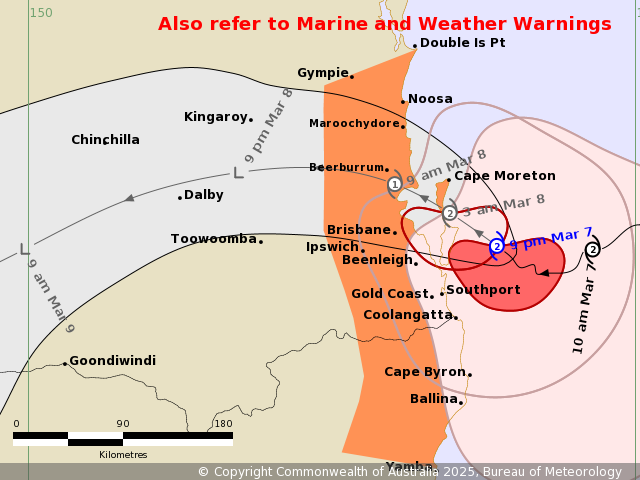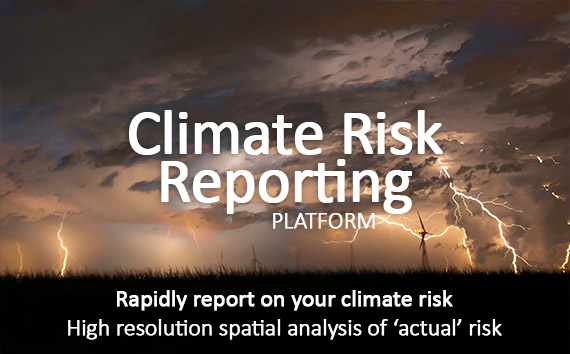Source: Bureau of Meteorology
Issued at 9:03 pm EST on Friday 7 March 2025
Headline:
Tropical Cyclone Alfred is expected to cross the Moreton Bay
Islands Saturday morning. Rainfall, wind and ocean impacts are
likely for southeast Queensland and northeast New South Wales
tonight and over the weekend.
Areas Affected:
Warning Zone
Double Island Point in Queensland to Yamba in New South Wales,
including Brisbane, Gold Coast, Sunshine Coast, Byron Bay and
Ballina but not including Gympie .
Watch Zone
None.
Cancelled Zone
None.
Details of Tropical Cyclone Alfred 22U at 9:00 pm AEST [10:00 pm
AEDT]:
Intensity: Category 2, sustained winds near the centre of 95
kilometres per hour with wind gusts to 130 kilometres per
hour.
Location: within 20 kilometres of 27.6 degrees South 153.9 degrees
East, estimated to be 80 kilometres east of Brisbane and 70
kilometres northeast of Gold Coast.
Movement: west northwest at 6 kilometres per hour.
Tropical Cyclone Alfred, category 2, is most likely to cross over
the Moreton Bay Islands Saturday morning before crossing the
mainland coast, between Maroochydore and Brisbane later during the
day. Alfred is expected to weaken as it moves inland late Saturday
and Sunday.
Hazards:
HEAVY RAINFALL bands are continuing to move over southeast
Queensland and northeast New South Wales. HEAVY to locally INTENSE
RAINFALL which may lead to DANGEROUS AND LIFE-THREATENING FLASH
FLOODING is likely to develop this evening and increase into
Saturday. Once Alfred crosses the coast, it is likely to weaken
below tropical cyclone strength later on Saturday. However, HEAVY
to locally INTENSE RAINFALL is expected to continue near and south
of the system centre during the weekend. Separate Severe Weather
Warning, Flood Watches, and Flood Warnings are current for
southeast Queensland and northeast New South Wales.
ABNORMALLY HIGH TIDES are likely to continue causing MINOR
FLOODING of coastal low lying areas between Double Island Point and
Ballina, particularly during tonight's (early Saturday) high tide.
DAMAGING SURF leading to significant beach erosion remains likely
for the open beaches between Double Island Point and Yamba, and
further south over the New South Wales coast. Separate Coastal
Hazard and Hazardous Surf warnings are current for southeast
Queensland and New South Wales coasts.
Gales with DAMAGING WIND GUSTS to 120 kilometres per hour are
occurring near the coast between Cape Moreton and Yamba. Gales with
DAMAGING WIND GUSTS to 120 kilometres per hour are expected to
extend to adjacent inland areas between Beerburrum and Ballina
during tonight. These winds may extend to exposed coastal locations
further north to Double Island Point overnight or during Saturday
morning as Alfred approaches the coast.
DESTRUCTIVE WIND GUSTS of up to 150 kilometres per hour to develop
about the Moreton Bay Islands and exposed coastal location on the
northern Gold Coast from tonight, as Alfred's destructive core
approaches the coast. The destructive winds may persist until
Alfred crosses the coast early Saturday morning.
Although Alfred is expected to weaken and move inland during
Saturday, DAMAGING WIND GUSTS may continue, particularly over
elevated terrain, during Saturday. A separate Severe Weather
Warning is current.
Refer to associated warnings for Queensland and New South Wales at
http://www.bom.gov.au/australia/warnings.
Recommended Action:
People between Cape Moreton and Ballina, including the Moreton Bay
Islands should remain inside until conditions have eased and listen
to the next advice.
People between Yamba and Ballina in New South Wales, as well as
Brisbane to Double Island Point in Queensland should take
precautions and listen to the next advice.
- For cyclone preparedness and safety advice, visit the Get Ready
Queensland website (www.getready.qld.gov.au)
- If you choose to take shelter away from your home, stay COVID-19
safe and pack a mask and hand sanitiser (if you have them).
- For emergency assistance call the Queensland State Emergency
Service or New South Wales State Emergency Service (SES) on 132 500
(for assistance with storm damage, rising flood water, fallen trees
on buildings or roof damage).
Current
Tropical Cyclones

07/Mar/2025 11:23 AM



